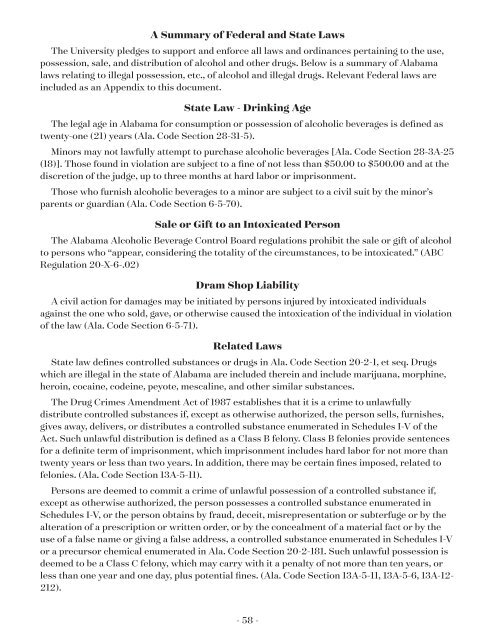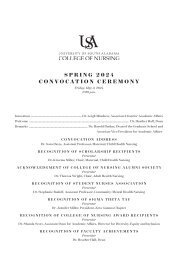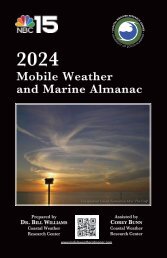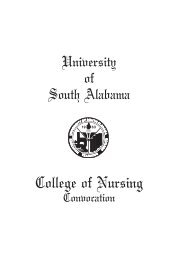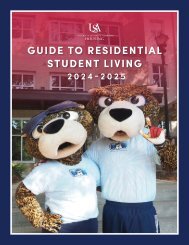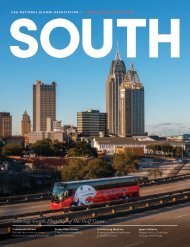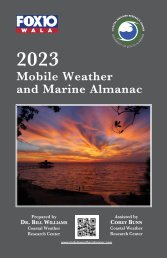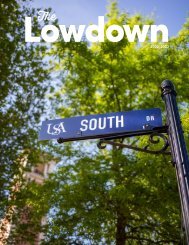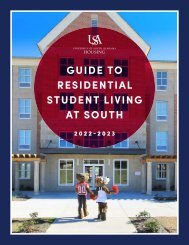The Lowdown 23-24
University of South Alabama Student Handbook
University of South Alabama Student Handbook
You also want an ePaper? Increase the reach of your titles
YUMPU automatically turns print PDFs into web optimized ePapers that Google loves.
A Summary of Federal and State Laws<br />
<strong>The</strong> University pledges to support and enforce all laws and ordinances pertaining to the use,<br />
possession, sale, and distribution of alcohol and other drugs. Below is a summary of Alabama<br />
laws relating to illegal possession, etc., of alcohol and illegal drugs. Relevant Federal laws are<br />
included as an Appendix to this document.<br />
State Law - Drinking Age<br />
<strong>The</strong> legal age in Alabama for consumption or possession of alcoholic beverages is defined as<br />
twenty-one (21) years (Ala. Code Section 28-31-5).<br />
Minors may not lawfully attempt to purchase alcoholic beverages [Ala. Code Section 28-3A-25<br />
(18)]. Those found in violation are subject to a fine of not less than $50.00 to $500.00 and at the<br />
discretion of the judge, up to three months at hard labor or imprisonment.<br />
Those who furnish alcoholic beverages to a minor are subject to a civil suit by the minor’s<br />
parents or guardian (Ala. Code Section 6-5-70).<br />
Sale or Gift to an Intoxicated Person<br />
<strong>The</strong> Alabama Alcoholic Beverage Control Board regulations prohibit the sale or gift of alcohol<br />
to persons who “appear, considering the totality of the circumstances, to be intoxicated.” (ABC<br />
Regulation 20-X-6-.02)<br />
Dram Shop Liability<br />
A civil action for damages may be initiated by persons injured by intoxicated individuals<br />
against the one who sold, gave, or otherwise caused the intoxication of the individual in violation<br />
of the law (Ala. Code Section 6-5-71).<br />
Related Laws<br />
State law defines controlled substances or drugs in Ala. Code Section 20-2-1, et seq. Drugs<br />
which are illegal in the state of Alabama are included therein and include marijuana, morphine,<br />
heroin, cocaine, codeine, peyote, mescaline, and other similar substances.<br />
<strong>The</strong> Drug Crimes Amendment Act of 1987 establishes that it is a crime to unlawfully<br />
distribute controlled substances if, except as otherwise authorized, the person sells, furnishes,<br />
gives away, delivers, or distributes a controlled substance enumerated in Schedules I-V of the<br />
Act. Such unlawful distribution is defined as a Class B felony. Class B felonies provide sentences<br />
for a definite term of imprisonment, which imprisonment includes hard labor for not more than<br />
twenty years or less than two years. In addition, there may be certain fines imposed, related to<br />
felonies. (Ala. Code Section 13A-5-11).<br />
Persons are deemed to commit a crime of unlawful possession of a controlled substance if,<br />
except as otherwise authorized, the person possesses a controlled substance enumerated in<br />
Schedules I-V, or the person obtains by fraud, deceit, misrepresentation or subterfuge or by the<br />
alteration of a prescription or written order, or by the concealment of a material fact or by the<br />
use of a false name or giving a false address, a controlled substance enumerated in Schedules I-V<br />
or a precursor chemical enumerated in Ala. Code Section 20-2-181. Such unlawful possession is<br />
deemed to be a Class C felony, which may carry with it a penalty of not more than ten years, or<br />
less than one year and one day, plus potential fines. (Ala. Code Section 13A-5-11, 13A-5-6, 13A-12-<br />
212).<br />
- 58 -


